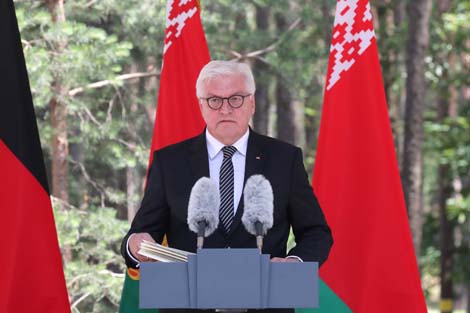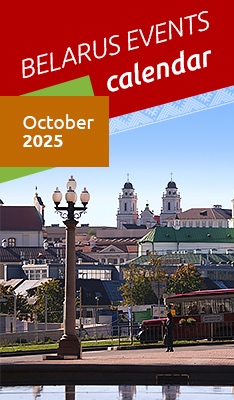Opinions & Interviews
German president vows to preserve memory about victims of Nazi crimes

MINSK, 29 June (BelTA) – In his speech during the requiem rally at the site of the former death camp Trostenets German President Frank-Walter Steinmeier promised to keep alive the knowledge about the crimes committed by the Nazi during World War Two, BelTA has learned.
The German president said: “The closer you get to this place, the harder it is to keep walking. Knowledge about what happened here weighs heavily on one’s shoulders. Those, who come here, have read or heard about the crimes committed by the Germans against Belarusians, European neighbors of Germany or their own compatriots. Those people know the devastating footprint the last dreadful war has left in this land. More than one fourth of Belarus’ population did not survive the German occupation.”
Frank-Walter Steinmeier recalled the plot of the Soviet movie Idi i smotri (Come and See) directed by Elem Klimov and screened in 1985. “It was the year when the iron curtain started twitching and the movie by this magnificent Soviet director was screened all over Europe – including the east and the west. We met the war face to face. Not the kind of war we’d known until then. It was a war to overshadow all the previous wars. A war, which maimed entire generations and changed the look of our continent: it was a campaign staged by the German Wehrmacht to eradicate the Soviet Union,” stated the German leader.
“Come and see! Yes, it is difficult to resist this call. It is still difficult. We are terrified by hundreds of thousands of victims that hell has devoured. Those people lost their names before they were pushed into the camps, poisoned with gas or driven right from the platform of the railway station in Maly Trostenets to execution grounds to be shot. We are terrified by that war, by plans, orders, and methods of warfare aimed at total elimination. Belarus had to experience what it means firsthand. More than 600 villages and their residents were razed to the ground,” said Frank-Walter Steinmeier.
Frank-Walter Steinmeier noted that those events had been caused by people and those crimes had German names behind them – Heinrich Himmler, Reinhard Heydrich, Erich von dem Bach-Zelewski, Oskar Dirlewanger…
“This place – Maly Trostenets – was captured by the Wehrmacht as ‘lebensraum’, life space in the east. It became a place of death. It was at the very end of a chain of directives. It was not mentioned by any geographic maps but it was mentioned by the plan to resolve the Jewish problem once and for all. It is high time the place had been reinstituted in the historic conscience of Europe,” said the German president. “What happened here left deep wounds. Everyone, who wants to see them, will see them. Come and see is an appeal directed at us, the generations born later on.”
Frank-Walter Steinmeier is convinced that the common European responsibility for preventing wars stems from the knowledge of what people did to other people in places like the Trostenets death camp. This is why it is important to study history and pass the knowledge onto every next generation. “Belarus’ history is part of this historic memory of Europeans, primarily Germans. After nearly 30 years of independence it is time for this country in our conscience and understanding to leave the shadow of the Soviet Union. It is time for Belarus to be recognized as a country with its own past, present, and future,” believes the German president.
Frank-Walter Steinmeier noted that the Trostenets Memorial Complex stands not only for a dreadful page of Belarusian history but common memory, too. It is a result of joint efforts of Belarusian and German historians and community groups such as the international education centers in Belarus and Germany. “This cooperation would have been impossible without Belarus’ will to make peace. We should never forget that the purpose of the eradication war Germany launched was to wipe out the country and the people, who lived there. The deeper my humility, the more grateful I am to people in Belarus for their will to make peace,” stressed the German leader.
Frank-Walter Steinmeier admitted that Germany had gone a long way to accept the memory of these crimes. “We needed too much time to recognize this responsibility. Today our responsibility is to keep alive the knowledge of what happened here. I can tell you that we will defend this responsibility, including from those, who say it has expired due to the passage of time. Come and see is a debt we can never repay. And this is why today as the president of Germany, as a German, and as a man I stand before you feeling gratitude for the signs of reconciliation, feeling shame and sorrow for the suffering the Germans caused to Belarus,” concluded Frank-Walter Steinmeier.







 print version
print version make home page
make home page add to bookmarks
add to bookmarks

